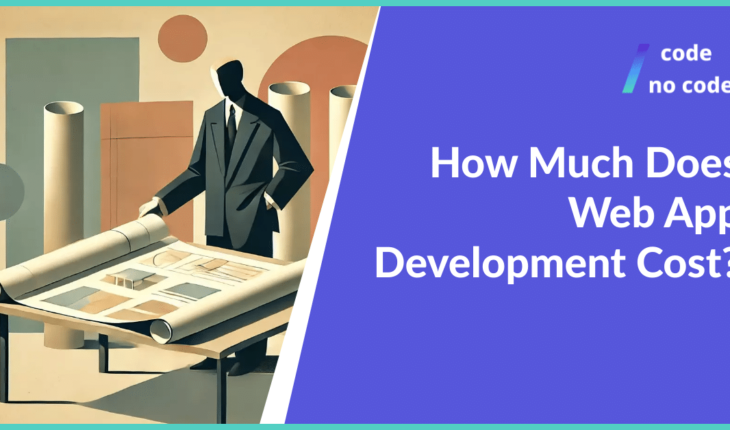Knowing web app development costs is crucial if you plan to develop a web app. Costs can range significantly based on factors like app functionality and development teams. This article will explain the key elements that influence these costs. You’ll understand how much web app development cost by the end.
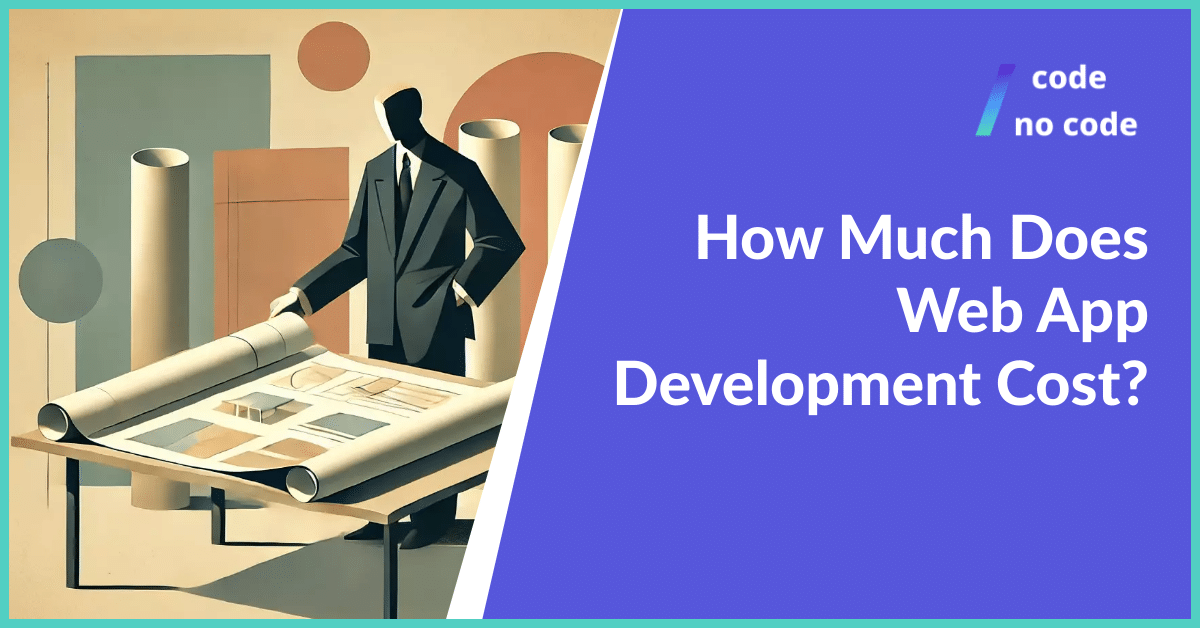
What is a web app?
A web app, or web application, is a software application you can access and use through a web browser. This means you don’t need to download and install it on your computer; instead, you open your web browser and visit the app’s website.
Key features of web apps:
- Browser-based: They run within a web browser like Chrome, Firefox, Safari, or Edge.
- Remote access: You can access them from any device with an internet connection.
- No installation: No need to download and install software on your computer.
- Automatic updates: Developers can update web apps remotely, ensuring you always have the latest version.
- Cross-platform compatibility: They usually work on different operating systems like Windows, macOS, and various mobile platforms.
Why Develop a Web Application

There are hundreds of reasons why you could or should build an app, depending on what your web application can do. But here are the most general benefits:
Improved Business Efficiency:
- Automation: Web apps can automate repetitive tasks, saving time and reducing errors.
- Data Management: They enable efficient data collection, storage, and analysis.
- Optimized Processes: Web apps can optimize workflows and improve communication within teams.
Increased Brand Visibility:
- Digital Presence: A web app establishes a strong online presence for your business.
- SEO Benefits: Well-designed web apps can improve search engine rankings.
- Social Media Integration: Web apps can be integrated with social media platforms to expand reach.
Scalability and Flexibility:
- Adaptability: Web apps can be easily scaled to accommodate growth and changing needs.
- Remote Access: They enable remote work and collaboration.
- Cross-Platform Compatibility: Web apps work on various devices and operating systems.
Factors that influence web app development cost

Several factors can influence the cost of web app development:
1. Complexity of the App:
- Features and Functionalities: More complex features, such as real-time updates, advanced integrations, and AI/ML components, will increase development time and cost.
- User Interface/User Experience (UI/UX) Design: A sophisticated and intuitive UI/UX design requires more design effort, which can impact the overall cost.
- Developing a complex web app can significantly increase overall expenses.
2. Technology Stack:
- Programming Languages: The choice of programming languages and frameworks can influence development costs. Some technologies may be more expensive to use or require specialized expertise.
- Third-Party Integrations: Integrating with third-party APIs and services can add complexity and cost.
3. Development Team:
- In-House vs. Outsource: In-house development teams have higher overhead costs, while outsourcing can be more cost-effective but may require careful vendor selection.
- Developer Experience: Experienced developers can work more efficiently, but they may also charge higher rates.
4. Project Timeline:
- Time Constraints: Tight deadlines may require additional resources and overtime, increasing the overall cost.
- Iterative Development: An iterative approach with frequent feedback and adjustments can be more costly but can lead to a better final product.
5. Maintenance and Support:
- Ongoing Costs: Post-development costs, such as hosting, maintenance, and support, should be factored into the overall budget.
- Updates and Upgrades: Future updates and upgrades may require additional development time and resources.
Web App Development Company: Roles and Responsibilities

A successful web app development project relies on a team of professionals with diverse skill sets. Here are the key roles within a web app development company and their responsibilities:
- Project Manager: The project manager oversees the entire project, ensuring timely delivery and efficient resource management. They act as the primary point of contact between the client and the development team.
- Business Analyst: The business analyst gathers requirements, defines the project scope, and ensures that the web app aligns with the business objectives. They play a crucial role in translating business needs into technical specifications.
- UX/UI Designer: UX/UI designers are responsible for creating wireframes, prototypes, and high-fidelity designs. They focus on the web app’s layout and user experience, ensuring that it is intuitive and engaging.
- Frontend Developer: Frontend developers build the web app’s user interface using HTML, CSS, and JavaScript. They ensure that the app is responsive and provides a smooth user experience across different devices.
- Backend Developer: Backend developers handle the server-side logic, database integration, and API connectivity. They use programming languages like Java, Python, or Ruby to ensure that the web app can process and manage data effectively.
- Quality Assurance Engineer: QA engineers test the web app for functionality, usability, and performance. They identify and fix bugs, ensuring that the app meets the required standards before deployment.
How Much Does It Cost to Build a Web Application?
As mentioned before, there can be a lot of aspects that will influence web application development costs. But there is a tool that can help you with knowing more about them accurately: AI Software Cost Estimator.
For your convenience, I have created some estimates for a sample e-commerce application, content management system, and social media web application.
Just a heads-up: The numbers below are for developing software from scratch. The final price for your web app project will depend on how you decide to build it—outsourcing a team, building in-house, and so on. These costs are estimates if you decide to hire a software development company.
How much does it cost to build a web app: e-commerce application
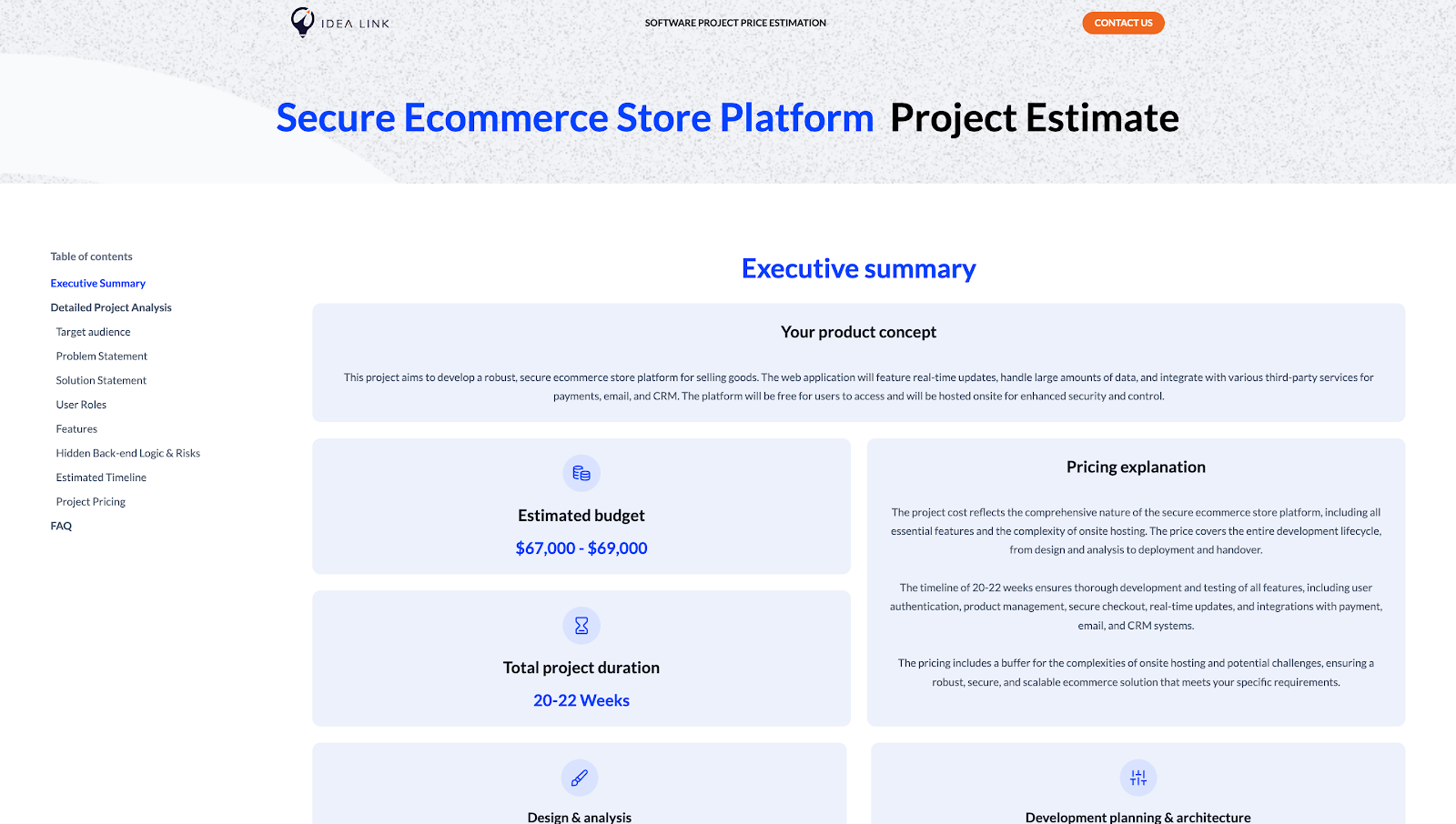
The estimated cost to build a secure e-commerce web application ranges from $67,000 to $69,000. This estimate includes the entire development lifecycle over 20-22 weeks, including:
- Design and Analysis: 2.5 weeks
- Development Planning and Architecture: 1.5 weeks
- Development: 12 weeks
- Quality Assurance (QA): 2.5 weeks
- Deployment and Handover: 2 weeks
The cost reflects the nature of the project, covering essential features such as:
- User registration and authentication
- Product catalog management
- Shopping cart functionality
- Secure checkout process
- Order and inventory management
- Real-time updates
- Payment integration
- Email notifications
- CRM integration
- Analytics and reporting
- Admin and Super Admin controls
You can read the full estimate here.
How much does it cost to build a web app: content management system
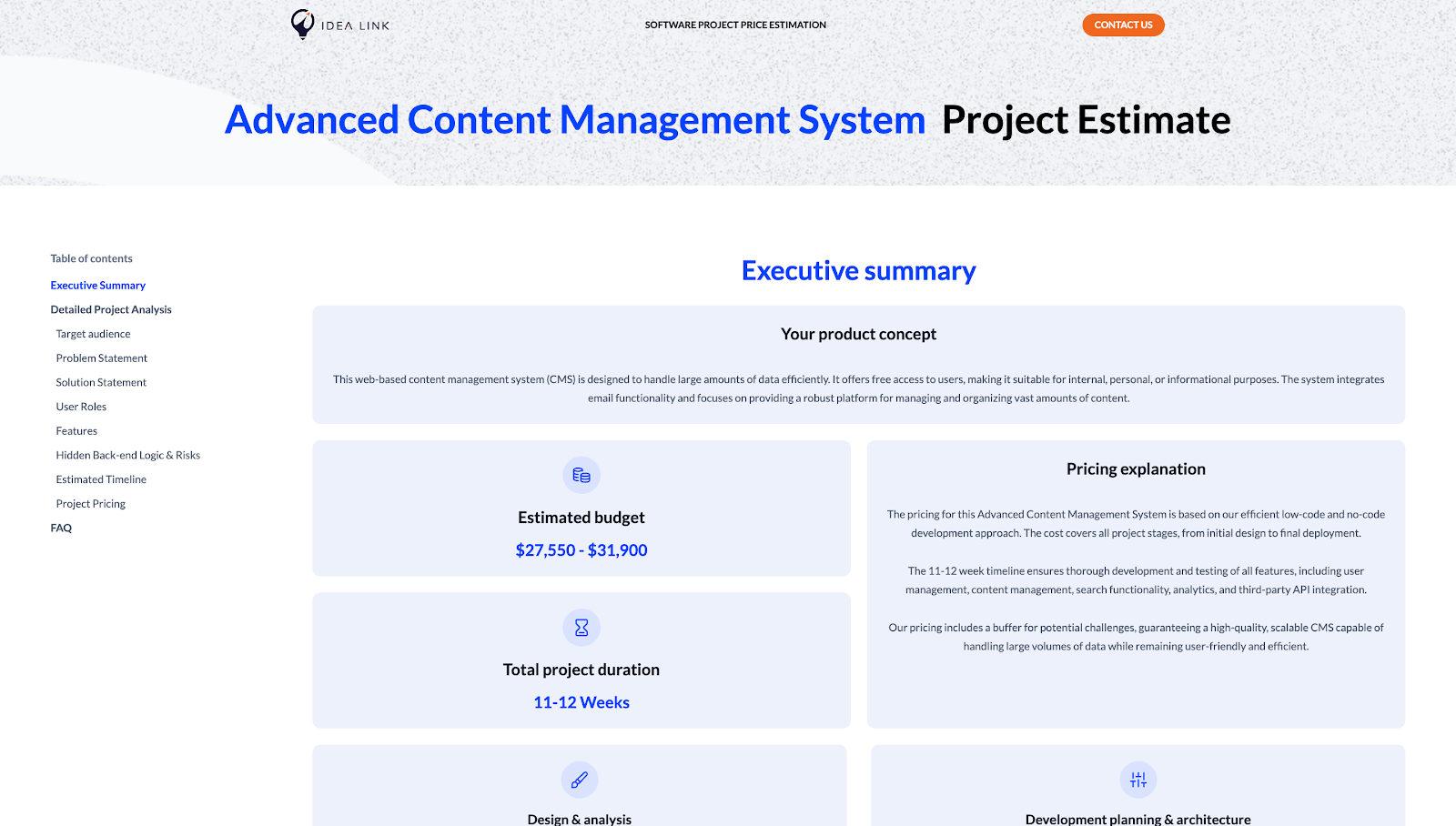
The estimated cost to build an advanced content management system (CMS) web application ranges from $27,550 to $31,900. The total project duration is estimated at 11-12 weeks, which includes:
- Design and Analysis: 1.5 weeks
- Development Planning and Architecture: 1 week
- Development: 6.5 weeks
- Quality Assurance (QA): 1.5 weeks
- Deployment and Handover: 1 week
The cost covers the entire development lifecycle, from initial design to final deployment, and accounts for features such as:
- User Management: Account creation, role assignment, and profile management
- Content Management: Creating, editing, and organizing large volumes of content
- Search and Filter Functionality: Advanced search options and filtering for efficient content retrieval
- Analytics and Reporting: Content performance metrics and custom report generation
- System Configuration: Email integration and system-wide settings management
- Data Management: Importing/exporting large datasets and data backup management
- Version Control: Content revision history and version comparison
You can read the full estimate here.
How much does it cost to build a web app: social media web application
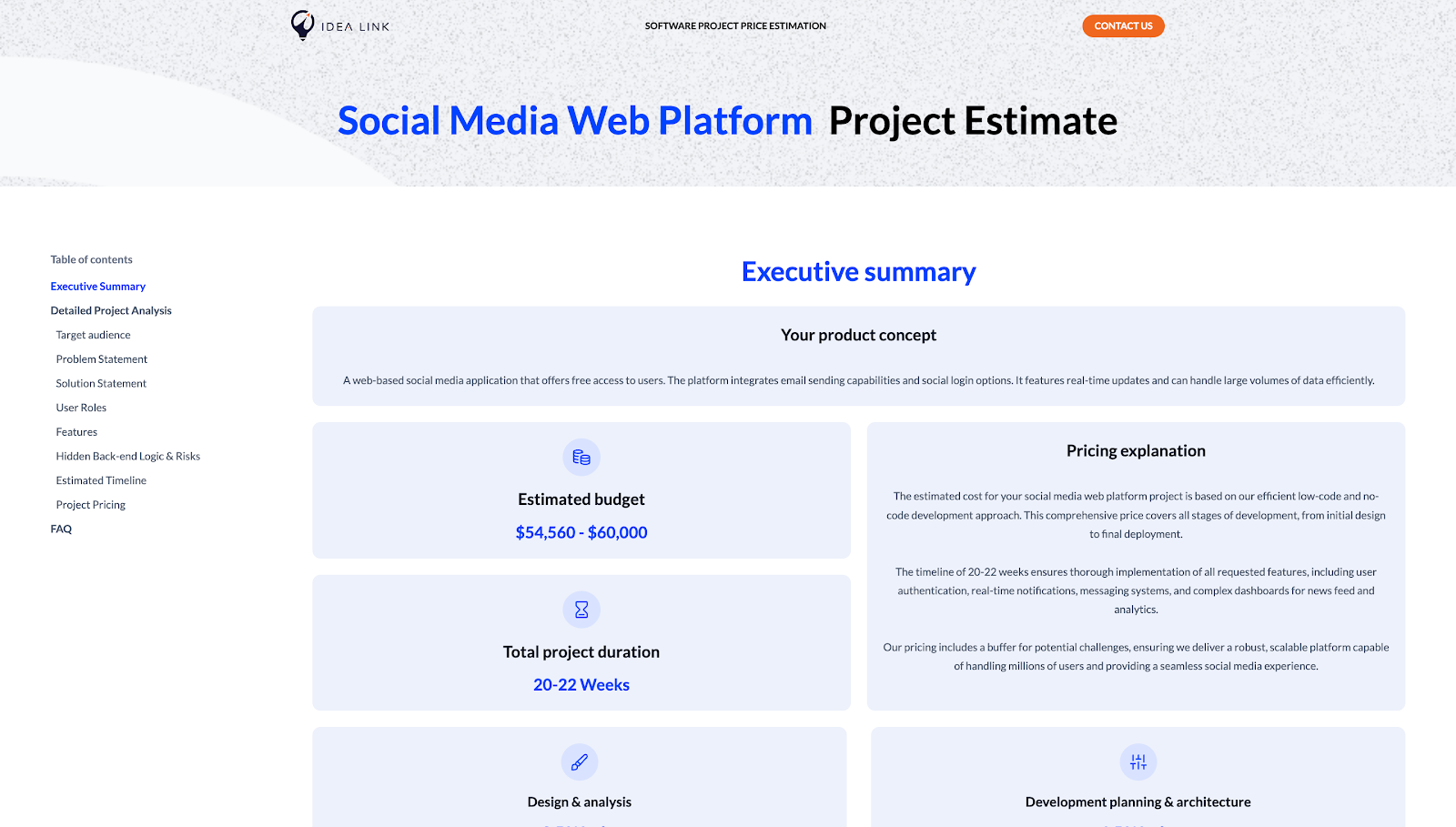
The estimated cost to build a social media web application ranges from $54,560 to $60,000. The total project duration is estimated at 20-22 weeks, which includes:
- Design and Analysis: 2.5 weeks
- Development Planning and Architecture: 1.5 weeks
- Development: 12-13 weeks
- Quality Assurance (QA): 2.5 weeks
- Deployment and Handover: 1.5 weeks
This price covers all stages of development, from initial design to final deployment, and accounts for features such as:
- User Registration and Login: Account creation, social login options, password reset
- Profile Management: Edit profile information, upload profile pictures, manage privacy settings
- Post Creation and Sharing: Create posts with text, images, or videos; tag other users; set post visibility
- Friend/Follower System: Send and accept friend requests, follow/unfollow users, view friends and followers lists
- News Feed: View posts from friends and followed users, like, comment, and share posts, sort feed by recent or popular
- Real-time Notifications: Receive and manage real-time notifications, notification history
- Messaging System: Private messaging, group chats, media sharing, search message history
- Search Functionality: Search for users and posts, filter results, view trending topics or hashtags
- Content Moderation: Moderators can review reported content, remove inappropriate posts, manage user warnings and suspensions
- Analytics Dashboard: Admins can view user growth statistics, monitor engagement metrics, analyze content trends, generate reports
You can read the full estimate here.
If you did not find any pricing that is suitable try out the tool yourself and just enter what features you want.
Engagement Models and Their Impact on Costs

The engagement model you choose for your web app development project can significantly impact the overall costs. Here are the two primary engagement models:
Fixed Price vs Non-Fixed Price Projects
- Fixed Price Projects: In a fixed price project, the web app development company provides a quote for the entire project, and the client pays a lump sum. This model is ideal for projects with well-defined requirements and a fixed scope. It offers cost certainty, making it easier to budget. However, it may not be suitable for projects with evolving requirements, as any changes can lead to additional costs.
- Non-Fixed Price Projects: In a non-fixed price project, the web app development company charges the client on an hourly or daily basis. The total cost is calculated based on the actual time spent on the project. This model is suitable for projects with uncertain requirements or a dynamic scope. It offers flexibility, allowing for changes and adjustments throughout the development process. However, it can lead to cost overruns if not managed properly.
More factors that impact the cost of web application development

Here are some additional factors that can impact the cost of web application development:
1. Third-party Integrations:
- Complexity of Integration: Integrating with third-party APIs and services, such as payment gateways, social media platforms, or analytics tools, can add complexity and cost.
- Licensing Fees: Some third-party services may require licensing fees, which can impact the overall budget.
2. Security and Compliance:
- Security Measures: Implementing robust security measures, such as encryption, firewalls, and regular security audits, can increase development costs.
- Compliance Standards: Adhering to industry regulations like GDPR, HIPAA, or PCI DSS can require additional security measures and compliance certifications.
4. Testing and Quality Assurance:
- Thorough Testing: Rigorous testing, including unit testing, integration testing, and user acceptance testing, is crucial to ensure the quality of the application.
- Bug Fixing: Identifying and fixing bugs can add to development time and cost.
- Effective Project Management: Effective project management is crucial for controlling costs and ensuring timely delivery.
6. Location of Development Team:
- Hourly Rates: The hourly rates of developers can vary significantly depending on their location and experience level.
- Time Zone Differences: Working with teams in different time zones can impact communication and project timelines.
Is it cheaper to build an app or website?
In general, it’s cheaper to build a website than an app. However, depending on the features you want and the complexity of the website, it can be more expensive than creating an app or mobile app, for example.
Final thoughts

The cost of web app development depends on a few different things, like the complexity, the technology stack, and the team you choose. A web app for e-commerce can cost anywhere from $67,000 to $69,000, including all stages of development from design to deployment. A content management system, which is usually pretty simple, can cost between $27,550 and $31,900. The key is to figure out what your project needs are and then use these estimates as a starting point for budgeting.
How complex the development is, which technologies you choose, and whether you need to integrate third-party software all affect the cost. A more feature-rich app or one that needs to be integrated with other apps, like payment gateways or social media, will take more time and money.

